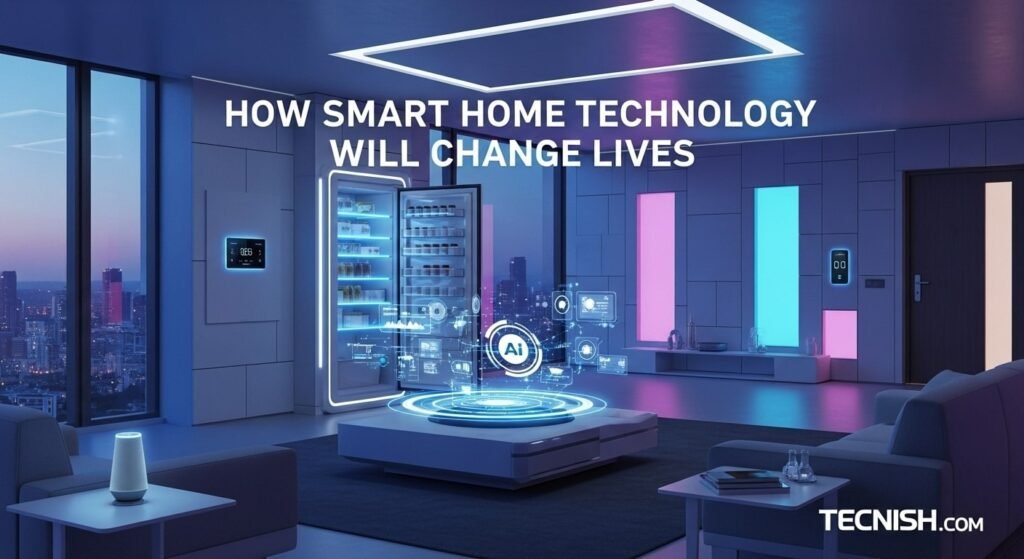Smart home technology is not just for the future. It is changing how we live now. Devices like Amazon’s Alexa let you control your home with your voice. Smart appliances save energy by working better. How smart home technology will change lives is clear. Samsung’s smart appliances learn how you use them and adjust on their own. Google’s new AI tools help different smart home devices work together. This makes your home smarter and easier to manage.
Living in a smart home has changed how I manage time, energy, and peace of mind. It feels like my home has become a helpful partner that anticipates my needs. That’s the true power of smart living—it adapts to you, not the other way around.
What Is Smart Home Technology and Why It Matters
Smart home technology stands for internet-connected devices in your home that do automatic tasks and allow you to control them with your voice and phone. These types of smart make your life easier, safer, and more efficient.
From security systems and smart appliances to voice-controlled lights, smart homes are all about automation and control. This technology can smartly bring you comfort, saves time, lower energy bills, and help you live smarter, not harder.
Today, how smart homes improve daily life isn’t just a tech trend it’s a practical solution for busy families, professionals, and anyone who wants more out of their living space.
Key Benefits of Smart Home Technology

Key Benefits of Smart Home Technology
Enhancing Daily Convenience with Voice and Automation
Imagine waking up and saying, “Good morning,” and your home responds. It opens the curtains, turns on the coffee maker, and plays your favorite playlist.
With tools like Alexa, Google Assistant, and Siri, your home listens and acts. You can ask to dim the lights, set reminders, play music, or adjust the temperature all hands-free.
But the real charm lies in automation. You can set routines that your home follows. For instance, when you leave the house, the lights turn off, the doors lock, and the thermostat adjusts—all without lifting a finger.
This is not just cool; it’s practical. These smart routines help save time and reduce stress. Whether you’re managing a family or living solo, How Smart Home Technology Will Change Lives becomes clear you do less while your home does more.
Revolutionizing Home Security with Smart Devices
Home safety is a top priority for all of us. With smart technology, keeping your home safe is easier and smarter. You no longer need bulky alarm systems or expensive monitoring services.
Enhancing home security with smart devices has many tools smart doorbells, security cameras with voice, smart locks, and motion detectors. A smart doorbell lets you see who’s at your door through your phone, even if you’re not home. You can talk to people or check instantly.
By using a smart lock, you can check through your smartphone.. You can give digital access to family or friends, and even track who comes and goes.
Smart cameras demonstrate alerts and recordings, giving you peace of mind and fearless. Some even come with facial recognition and night vision. When all these devices work together, your home becomes your smartest security guard.
Whether you’re home or away, smart security puts control back in your hands. That’s a big reason why more people trust tech for safety today.
Smart Home Solutions for Energy Efficiency

Smart Home Solutions for Energy Efficiency
Are your energy bills climbing every month? Smart home technology are affordable. Smart home solutions for energy efficiency use smart thermostats, lights, plugs, and energy monitors to help you use less and save more.
A smart thermostat like Nest or Ecobee learns your schedule and sets the perfect temperature without wasting power. Smart lights can be set to turn off when no one is in the room or follow natural daylight cycles.
Smart plugs can control any device and switch off power-hungry appliances when not in use. Even water heaters, washers, and dryers can be connected for smart scheduling.
Want to go greener? Many smart homes now include solar panels, energy usage trackers, and automatic window shades to keep homes cool without using more electricity.
In simple words, smart home solutions for energy efficiency help you waste less energy, lower your bills, and live more sustainably.
Transforming Entertainment and Lifestyle at Home
Think about how smart home security and technology will change lives you watch TV or listen to music today. Now imagine doing all that with a voice command or a single tap on your phone. That’s what smart home entertainment is all about.
With smart TVs, streaming sticks, and wireless speakers, your living room turns into a mini movie theater or concert hall. You can ask your assistant to play a movie, dim the lights, and set the perfect room temperature—all at once.
Gaming consoles, projectors, and soundbars can be part of your smart setup too. And it’s not just about fun. With these tools, you can also join video calls, attend virtual workouts, or relax with calming music at the end of a long day.
This is where the impact of smart technology on lifestyle becomes clear. It helps you enjoy more, stress less, and makes every corner of your home part of your personal experience.
Smart Homes and Health

Wellness Monitoring and Mental Health Boost
A smart home isn’t just about saving energy or controlling lights—it can actually help improve your health. That’s right. The impact of smart technology on lifestyle extends to your physical and mental well-being too.
Smart wellness devices like sleep trackers, air quality monitors, and smart mattresses help you understand your body and your environment better. These tools can track your heart rate, breathing, temperature, and sleep quality. Some even connect to apps that give you tips for better rest and daily energy.
Smart air purifiers and humidifiers keep your home’s air clean and healthy. If you or someone in your family has allergies or asthma, these devices can make a big difference in comfort.
And let’s not forget about mental health. With smart lighting that mimics natural daylight, your mood and productivity can improve. Voice assistants can also play calming sounds, guide meditation sessions, or set reminders to take breaks during busy days.
All these features work together to create a space that supports your body and mind—turning your home into a wellness zone.
Support for Elderly and Differently-Abled Individuals
Smart home technology is the perfect for senior and disabled person. Imagine not needing to get up to turn off a light or struggling with small buttons on a thermostat. With smart tech, daily tasks become easier and safer.
You can control lights, doors, and appliances just by speaking. Smart doorbells let them see who’s at the door without getting up. Smart sensors can alert caregivers if someone falls or forgets to take medication. This is How Smart Home Technology Will Change Lives.
This support helps elderly individuals live more independently and confidently. It also gives peace of mind to family members who can monitor loved ones from afar.
These tools are not just helpful—they’re empowering. They offer freedom, comfort, and safety in ways that traditional tools simply can’t.
Future of Smart Home Technology

The future of smart home technology is set to revolutionize the way we live—bringing homes that are not only connected but also intelligent, adaptive, and deeply personalized. Read more here about how upcoming trends are shaping our homes.
We’re moving past simple automation like voice-activated lights or smart plugs toward fully synchronized environments that understand and react to your daily routines. From AI-powered assistants that manage your schedule to sensors that optimize energy usage in real-time, the next generation of smart homes will be smarter, greener, and more responsive.
Thanks to breakthroughs in IoT, machine learning, and ultra-fast 5G networks, future-ready homes will seamlessly integrate security, entertainment, lighting, and climate control into one effortless experience. These smart living trends are designed to give homeowners greater peace of mind, energy savings, and total lifestyle convenience—making the dream of a truly connected home not just a luxury, but a standard.
Integration and Ecosystem Choices

Choosing the Right Smart Home Ecosystem
When building a smart home, the ecosystem you choose matters. This is the platform all your devices connect to so they work together smoothly.
Popular ecosystems include Amazon Alexa, Google Home, Apple HomeKit, and Samsung SmartThings. Each one has its strengths. For example:
- Amazon Alexa: Great for voice control and wide device support.
- Google Home: Excellent for search integration and smart displays.
- Apple HomeKit: Ideal for privacy for apple users.
- Samsung SmartThings: Good for deep automation and smart appliance control.
Pick an ecosystem based on what devices you already own and what your goals are. Do you want the best voice assistant? Or the highest level of privacy? Or the easiest setup?
Choosing the right one ensures that all your gadgets play well together. this is How Smart Home Technology Will Change Lives It avoids frustration and keeps your smart home working like a team.
How Smart Homes Connect with Smart Cities
As more people use smart home devices, cities are getting smarter too. how smart home technology will change lives is starting to influence entire neighborhoods and towns.
Smart cities use data from homes and infrastructure to manage traffic, energy, and public services more efficiently. For example, when your smart home lowers energy use during peak hours, it helps the city avoid blackouts.
Some smart homes can even share data with city systems (with your permission) to report problems like water leaks, pollution, or road damage.
Smart homes also help in emergencies. Fire and smoke detectors can alert local emergency services. Elderly care systems can connect with hospitals in case of a fall or health issue.
Together, smart homes and smart cities create connected communities that are safer, more efficient, and better to live in.
Challenges and Considerations

Privacy and Security Concerns
With all the amazing features of smart home and security, one big concern stands out—privacy and security. Since these devices are connected to the internet and often collect personal data, it’s important to protect your home from hackers and data leaks.
Think about it: your smart speaker hears you all day. Your security camera sees your front porch. Your thermostat knows when you’re home or away. If this data gets into the wrong hands, it can be misused.
So how do you stay safe?
- Use strong passwords for all your smart devices and Wi-Fi network.
- Enable two-factor authentication on your accounts.
- Update software regularly to patch security holes.
- Buy devices from trusted brands that offer security updates.
- Check privacy settings on your smart assistant and apps.
These steps can help keep your smart home safe. As smart tech grows, companies are working hard to build better privacy tools, but it’s still up to you to be smart about your setup.
Even though there are risks, the benefits can outweigh them—if you’re careful.
Cost vs. Value: Is It Worth the Investment?
Smart home gadgets aren’t always cheap. From smart thermostats to security systems, the cost will be high.
Here’s why:
- Smart thermostats and lights can reduce your energy bills. Over time, they pay for themselves.
- Smart security systems often cost less than traditional alarms but give more features and control.
- Convenience and time savings are harder to measure in dollars, but they add value to daily life.
To get the most from your investment, start small. Focus on devices that offer real value—like a smart lock, thermostat, or voice assistant. Then build over time.
Also, watch for bundles and discounts. Many companies offer starter kits or sales that make entry easier.
So, while smart homes require an upfront cost, the return in comfort, savings, and safety is usually worth it. It’s not about having the fanciest gadgets—it’s about using smart tools that truly improve your life.
What the Future Holds
The future of Smart Home Technology
Emerging Innovations and Trends in Smart Living
Smart homes are still evolving. The future is exciting with intelligent and personal.
Here are some trends to watch:
- AI-Powered Homes: Artificial Intelligence will help homes learn from your habits and adjust automatically.
- More Natural Voice Interactions: Assistants will understand context better, so conversations feel more human.
- Smarter Health Devices: Wearables and home sensors will offer deeper insights into your wellness.
- Eco-Friendly Tech: Devices that save water and reduce waste will become more common.
- Robotics: Cleaning bots are just the start—soon, home robots may help with cooking, laundry, or even elder care.
These innovations will push the impact of smart technology on lifestyle to the next level. Smart homes won’t just react to you—they’ll understand you.
Your homes will become safer, greener, and more connected.
The Long-Term Impact of Smart Home Technology
Looking ahead, smart homes will change how we live in deep, lasting ways. They’ll reshape How Smart Home security and Technology Will Change Lives we interact with our homes, our cities, and even each other.
Think of the shift like the move from landline phones to smartphones. It’s that big.
Here’s what we can expect long term:
- Homes that manage themselves and alert us only when needed.
- Stronger links between homes, workplaces, and communities.
- Reduced carbon footprints due to better energy use.
- A rise in independent living for seniors and disabled people.
- Cities built around smart services, powered by smart homes.
The best part? We’re still early in the journey. Now is the perfect time to learn, adapt, and make your home a part of the smart living revolution.
Conclusion
Final Thoughts and Getting Started with Your Smart Home
So, where do you begin?
Start small. Choose one area of your home that you’d love to make easier—maybe it’s the lights, the thermostat, or your front door security. Invest in a reliable device that fits your needs and make sure it’s compatible with your chosen ecosystem like Alexa, Google Home, or Apple HomeKit.
As you get comfortable, slowly build out your setup. Add voice assistants, smart plugs, or cameras. Just remember, you don’t need to do it all at once. Smart home living is a journey, not a race.
More importantly, what’s your intention Do you want better comfort? Lower bills? More safety? Let those goals guide your choices.
In the end, the benefits of home automation systems go far beyond fancy gadgets. The more you use it, the more you realize How Smart Home Technology Will Change Lives , making things simpler, safer, and more enjoyable.
Welcome to the future. Your smart home is waiting.
FAQs About Smart Home Technology
1. What are the main benefits of home automation systems?
The benefits of home automation systems include convenience, energy savings, improved security, and remote control over your home. You can automate everyday tasks like lighting, heating, and security, making life easier and more efficient.
2. How do smart homes improve daily life?
How smart homes improve daily life lies in their ability to automate simple tasks. From waking up with smart alarms and coffee makers to going to bed with voice-controlled lights and thermostats, your home adapts to your lifestyle—saving time and reducing stress.
3. Are smart home devices safe from hackers?
Most smart devices are safe if you follow best practices: use strong passwords, update firmware regularly, and secure your Wi-Fi network. Choose reputable brands that offer strong security features and regular updates.
4. Can smart technology really save on energy bills?
Yes! Smart home solutions for energy efficiency like smart thermostats, lights, and plugs help reduce waste. They only use energy when needed, often learning your habits to improve savings over time.
5. What is the future of smart technology?
The future includes AI-powered automation, better integration with smart cities, health-monitoring tools, eco-friendly devices, and even home robots. The impact of smart technology on lifestyle will grow, making homes more responsive, efficient, and human-friendly.
If you want to stay updated on the latest innovations and trends in smart home technology, Tecnish is your go-to source. This website provides clear, reliable technology news that helps users understand how new gadgets and systems like smart home devices can improve daily life. Check out for the newest updates and expert insights.






6 Comments
[…] managing team meetings on Zoom, building presentations in Google Workspace, or coding for hours, the performance of your laptop directly impacts your productivity, comfort, and stress […]
[…] You still have money in your balance. → Withdraw it first!You have pending payments → Wait for them to finish.Your account is restricted. → Contact Cash App support. […]
[…] car, AI personalizes the driving experience—adjusting settings and providing real-time navigation. Connected vehicles powered by AI communicate with each other to reduce traffic and improve road […]
[…] Also read: Smart Home Devices for Seniors → […]
it is an wonderful article
[…] Accessories In 2025, cables are old news. A wireless charging pad lets you charge your phone, smartwatch, earbuds, and even your mouse — all in one spot. The best […]